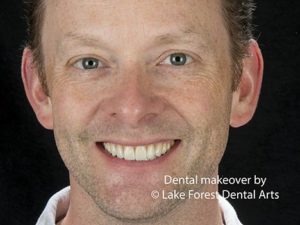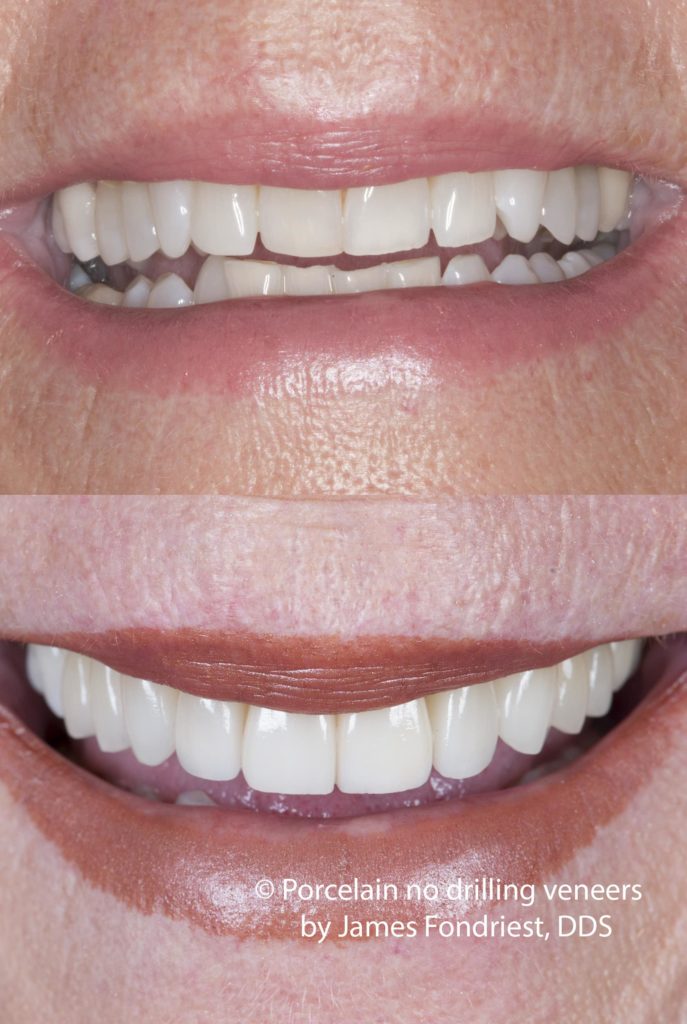
Doing dentistry with less drilling is good for you!
It is no secret that many people dread going to the dentist. It takes courage and trust to allow someone to scrape and poke inside your mouth. And what if they find that you need a filling, or worse, a root canal? Many of today’s dentists are advocates of dentistry with less drilling. That’s not to say they don’t fill teeth or give root canals. They just have the goal to conserve as much of the healthy tissue and tooth structure as possible. If you need dental work done, Dr. Fondriest, will be happy to discuss less invasive dentistry techniques and procedures.

This patient wanted her teeth whiter and straighter without any drilling. Brighter teeth were achieved using slightly more opaque porcelain to mask the natural teeth. Surprisingly, the wrinkles in her upper lip were reduced with the added thickness of the veneers! All evaluations are done with the final result in mind. If we can make you happy doing dentistry with less drilling, all the better for you.
What Is the Genesis of Less Invasive Dentistry
Dental research has proven that retaining original dentition and healthy tissue is more biologically valuable to the patient than replacing it with synthetic materials. From this discovery, less invasive dentistry was born. Advances in dental technology have made less invasive dentistry an attainable goal. Today’s dentists work to conserve as much of the healthy tooth structure and oral tissue as possible with each procedure.
Dentistry with less drilling requires more prevention
The first step is to maintain proper oral health to prevent decay and other dental diseases. In order to do this, Dr. Fondriest will educate you on proper oral care, and offer instruction specific to your unique case.
Several factors contribute to your oral health, including the amount of bacteria present in the oral cavity, diet, and genetics. For instance, your oral bacterial levels are high, Dr. Fondriest may suggest that you use an anti bacterial mouth rinse. He would also suggest that you limit ;your diet of carbohydrates that increase harmful bacteria in the oral cavity.
Some preventative techniques besides brushing and flossing include:
- Fluoride Treatments: Fluoride makes developing teeth stronger and more resistant to bacterial attacks. For developed teeth, the minerals in fluoride react with your saliva to refresh and strengthen the enamel. This will restore and protect your teeth, and reverse early signs of decay.
- Sealants: Sealants are a plastic resin, painted on the tooth. It covers the grooves and fissures, providing a barrier between the healthy tooth and harmful bacteria and plaque.
- Mouth Guards: Mouth guards are another means of prevention specifically for people who grind or clench (brux) at night. Bruxing can cause cracks, fractures, stress breaks, or other damage to the teeth and jaw. A dental impression is made and a customized bite guard is fabricated to fit the individual. This reduces stress on teeth and helps prevent damage.
Dentistry to restore teeth with less drilling
If a problem does develop, intercepting its progress by replacing as little of the natural tissue or dentition as possible, is the next step. At this point, minimally invasive techniques include:
- Remineralization: Bacteria and sugar together demineralize our teeth causing tooth decay. Removing the bacteria and it’s food source can reverse early decay in some instances. Fluoride is often used to restore the minerals and strengthen enamel. Other methods include, but are not limited to, tricalcium phosphate (TCP) and xylitol.
- Air Abrasion: Air abrasion may be used if the permanently affected. This technique uses an extremely fine abrasive powder blown with a stream of air to remove decay. It is used in place of a traditional drill.
- Veneers, Inlays And Onlays: Inlays and onlays are used in place of crowns, because they require minimal removal of tooth structure. An impression of the tooth is taken for a custom fit, and the inlay or onlay is glued to the tooth. Although porcelain veneers with less drilling is more difficult to do well, Dr. Fondriest is one of the only prosthodontists to have high level training in this procedure.
Benefits to the patient of dentistry with less drilling
Minimally invasive dentistry can help take the fear out of visiting your dentist. Benefits include:
- Better oral health
- Better overall health
- Fewer cavities and root canals
- Preservation of the natural state of dentition
- Less drilling
- Less pain
More about less invasive porcelain veneers
Learn more about less invasive dentistry:
If you have a fear of invasive dental procedures, consider getting a second opinion. We can determine if you are a candidate for dentistry with less drilling. Dr. Fondriest can answer your questions and help set your fears to rest. Dr. Fondriest combines his impressive array of experience with modern technology and caring, knowledgeable staff. We proudly serve patients from Chicago and surrounding communities. To schedule a consultation, call our office today at (847) 234-0517.
Dr Fondriest is a Nationally recognized and highly sought after cosmetic dentist. He serves clients from throughout the United States
